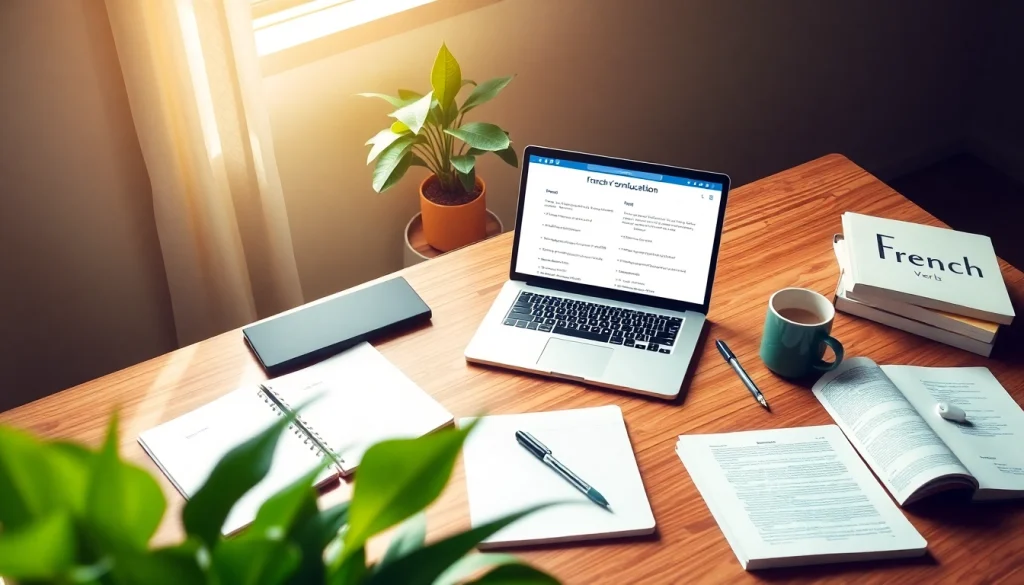Mastering French Verbs: A Complete Guide to Conjugation and Usage

Introduction to French Verbs
Learning a new language opens up a world of possibilities, and mastering a crucial aspect of any language is understanding its verbs. French, known for its rich history and influence, has a variety of verbs that can sometimes pose challenges for learners. This comprehensive guide will delve into the fundamentals of French Verbs, exploring their types, conjugations, applications, and effective learning strategies.
Understanding the Basics of French Verbs
At the core of the French language lie verbs, words that describe actions, occurrences, and states of being. In French, verbs are categorized into three groups based on their endings: -er, -ir, and -re. Each group follows a specific pattern of conjugation which is essential to understand for proper language use.
For instance, consider the verb aimer (to love) in the -er category, finir (to finish) from the -ir category, and vendre (to sell) from the -re category. Each group presents unique conjugation patterns that learners must navigate.
The Importance of Verbs in French Language
Verbs are the backbone of the French language, serving as the primary means of expressing actions and states. They convey not only what is happening but also provide context regarding timing and the nature of the action—whether it’s ongoing, completed, or about to happen. Understanding how to conjugate these verbs allows speakers to frame their thoughts clearly and accurately in conversations and written communication.
Types of French Verbs: Regular vs. Irregular
French verbs can be classified as regular or irregular. Regular verbs follow predictable patterns based on their group, making them easier to learn and conjugate. For example:
- Regular -er verb: aimer
- Regular -ir verb: finir
- Regular -re verb: vendre
Irregular verbs, however, do not conform to standard conjugation rules, often requiring memorization. These include essential verbs such as être (to be), avoir (to have), and aller (to go). Their irregularity often presents challenges for learners, yet they are crucial for having meaningful conversations in French.
Conjugation Patterns of French Verbs
Present Tense Conjugation Explained
The present tense is one of the most commonly used tenses in French. It indicates actions that are currently taking place and is formed by altering the verb endings based on the subject pronoun. Here’s how each verb group is conjugated in the present tense:
- -er verbs:
- Je aime
- Tu aimes
- Il/Elle aime
- Nous aimons
- Vous aimez
- Ils/Elles aiment
- -ir verbs:
- Je finis
- Tu finis
- Il/Elle finit
- Nous finissons
- Vous finissez
- Ils/Elles finissent
- -re verbs:
- Je vends
- Tu vends
- Il/Elle vend
- Nous vendons
- Vous vendez
- Ils/Elles vendent
Past and Future Tenses: What You Need to Know
Beyond the present tense, French verbs are also conjugated in past and future tenses, each with distinct rules. The compound past tense, known as passé composé, generally combines an auxiliary verb (either être or avoir) with the past participle of the main verb. For example:
- J’ai aimé (I loved).
- Elle est allée (She went).
The future tense is created using the infinitive form of the verb plus specific endings. For instance:
- J’aimerai (I will love).
- Nous finirons (We will finish).
Understanding how to navigate these tenses is vital for expressing a wide range of temporal actions in French.
Conjugation of Irregular French Verbs
Irregular verbs present a unique challenge, as their conjugation does not follow typical patterns. Some of the most commonly used irregular verbs include:
- Être:
- Je suis
- Tu es
- Il/Elle est
- Nous sommes
- Vous êtes
- Ils/Elles sont
- Avoir:
- J’ai
- Tu as
- Il/Elle a
- Nous avons
- Vous avez
- Ils/Elles ont
- Aller:
- Je vais
- Tu vas
- Il/Elle va
- Nous allons
- Vous allez
- Ils/Elles vont
Learning these conjugations is fundamental as they frequently appear in everyday conversations and written contexts.
Common French Verbs and Their Uses
Top 20 Essential French Verbs for Beginners
Mastering the basics is crucial for any language learner, and a good starting point is the top 20 essential French verbs. Here’s a list of these foundational verbs:
- Être (to be)
- Avoir (to have)
- Faire (to do/make)
- Aller (to go)
- Dire (to say)
- Voir (to see)
- Savoir (to know)
- Vouloir (to want)
- Pouvoir (to be able to/can)
- Devoir (to have to/must)
- Manger (to eat)
- Prendre (to take)
- Aimer (to like/love)
- Parler (to speak)
- Vivre (to live)
- Jouer (to play)
- Finir (to finish)
- Choisir (to choose)
- Travailler (to work)
- Regarder (to look/watch)
Familiarizing yourself with these verbs provides a strong foundation for constructing sentences and engaging in conversations.
Contextual Usage of French Verbs in Sentences
Understanding how to place verbs in sentences is as important as knowing the verbs themselves. Here are examples illustrating contextual usage:
- J’ai mangé une pomme. (I ate an apple.)
- Nous allons parler de notre projet. (We are going to talk about our project.)
- Il est médecin. (He is a doctor.)
- Ils vont au cinéma ce soir. (They are going to the movies tonight.)
By integrating these verbs into various contexts, learners can better grasp their implications and nuances.
Building Vocabulary with Common French Verbs
One effective way to enhance your French vocabulary is by grouping related verbs and using them in various contexts. For example:
- Avoir (to have): Je vais avoir un nouveau livre. (I am going to have a new book.)
- Faire (to do/make): Nous faisons le repas. (We are making the meal.)
- Dire (to say): Elle a dit la vérité. (She told the truth.)
This practice reinforces understanding and retention of verbs in useful settings.
Tips for Learning French Verbs Effectively
Practical Exercises for Practicing French Verbs
Effective learning of French verbs requires consistent practice. Here are several practical exercises:
- Flashcards: Create flashcards for French verbs and their conjugations. Use them to test your recall.
- Conjugation Drills: Regularly practice conjugating verbs in different tenses. Keeping a conjugation chart can help visually reinforce these patterns.
- Writing Sentences: Write sentences using new verbs to understand context and application.
Using Technology to Enhance Your Learning
In today’s digital age, technology plays a pivotal role in language acquisition. Utilize apps and online resources strategically:
- Language Learning Apps: Use apps to practice verb conjugations and vocabulary.
- Interactive Websites: Engage with websites designed for conjugating verbs and providing exercises.
- Online Videos: Explore educational videos that demonstrate conjugation techniques and usage examples.
Creating Effective Study Habits for French Language
To succeed in learning French verbs, establishing disciplined study habits is essential. Here are tailored strategies:
- Set Specific Goals: Define short-term and long-term language learning goals for motivation.
- Consistency Over Intensity: It’s better to study regularly in shorter sessions than to cram. Aim for steady, consistent practice.
- Engage with Native Content: Listen to French music, watch movies, and read books to immerse yourself in the language. This helps with verb recognition and contextual learning.
Resources for Further Study of French Verbs
Recommended Books and Online Tools
To deepen your knowledge and mastery of French verbs, explore these recommended resources:
- Textbooks: Consider reputable language textbooks specifically focused on French grammar and verbs.
- Online Courses: Enroll in online courses that offer structured learning paths for French verbs.
- Conjugation Websites: Utilize websites that provide comprehensive lists of conjugated verbs and explanations of verb forms.
Online Communities for French Language Learners
Joining online communities can provide invaluable support and resources for language learners. Look for:
- Facebook groups dedicated to French language learning.
- Language exchange platforms where you can practice speaking with native French speakers.
- Forums where learners and educators share tips and resources.
Track Your Progress with French Verbs
Monitoring your progress is crucial for staying motivated and aware of areas needing improvement:
- Journals: Maintain a language learning journal where you track new verbs learned and their uses.
- Assessment Quizzes: Regularly take quizzes to gauge your understanding of verb conjugation and usage.
- Peer Reviews: Connect with fellow learners to exchange feedback on your language usage.







